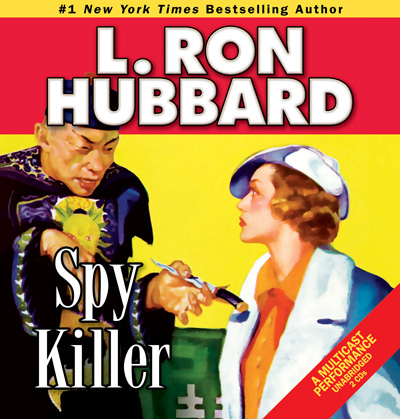American sailor Kurt Reid is a hothead and a hard case—a man who hits first and asks questions later. Scrappy and rough around the edges, it’s no wonder that when the ship’s captain turns up dead, it’s Reid who takes the rap.
Falsely accused and under the gun, Reid jumps ship and vanishes into Shanghai—only to get caught in a web of intrigue, betrayal, and murder. In a world where nothing is what it seems and everything is for sale, he’s soon out of his depth, drawn into a spy game in which the winner takes all … and the loser takes a knife to the back.
Will Reid live up to his reputation as the Spy Killer? He’ll have to learn the rules fast, because, with players like sexy Russian agent Varinka Savischna in the hunt, the game is about to turn as seductive as it is sinister.
Performers: R.F. Daley (narrator), Shane Johnson, Jim Meskimen, and Tait Ruppert.
“Exceptional … a genuinely entertaining listening experience.” —Publishers Weekly
* A Publishers Weekly Listen Up Award Winner
SAMPLE
ABOUT THE AUTHOR
As a young man, L. Ron Hubbard visited pre-Communist China three times, where his closest friend headed up British intelligence. In a land where communists, nationalists, warlords, and foreign adventurers schemed for control, Mr. Hubbard gained a unique insight into the intelligence operations and spy-craft in the region—a knowledge that informs stories like Spy Killer.
Spy Killer Glossary
Stories from the Golden Age reflect the words and expressions used in the 1930s and 1940s, adding unique flavor and authenticity to the tales. While a character’s speech may often reflect regional origins, it also can convey attitudes common in the day. So that readers can better grasp such cultural and historical terms, uncommon words or expressions of the era, the following glossary has been provided.
amah: (in India and the Far East) a female servant; maid.
bead on, drew a: took careful aim at. This term alludes to the bead, a small metal knob on a firearm used as a front sight.
belaying pin: a large wooden or metal pin that fits into a hole in a rail on a ship or boat, and to which a rope can be fastened.
bichloride of mercury: a water-soluble and deadly poisonous crystalline solid used for such things as embalming, to preserve wood, and to kill germs, insects and rodents. It is also a useful but dangerous antiseptic. To help distinguish it as poisonous when being dispensed as a topical antiseptic, it is in the form of blue angular-shaped tablets.
Big Town: nickname for New York City.
bucko: a person who is domineering and bullying.
bucko mate: the mate of a sailing ship who drives his crew by the power of his fists.
Bund: the word bund means an embankment and “the Bund” refers to a particular stretch of embanked riverfront along the Huangpu River in Shanghai that is lined with dozens of historical buildings. The Bund lies north of the old walled city of Shanghai. This was initially a British settlement; later the British and American settlements were combined into the International Settlement. A building boom at the end of the nineteenth century and beginning of the twentieth century led to the Bund becoming a major financial hub of East Asia.
Chi: Chicago.
cholera: an infectious disease of the small intestine, typically contracted from infected water.
chow bench: a short round table with four stools that fit underneath it.
clothes press: a piece of furniture for storing clothes, with hanging space and sometimes drawers or shelves.
Colt .45: a .45-caliber automatic pistol manufactured by the Colt Firearms Company of Hartford, Connecticut. Colt was founded by Samuel Colt (1814–1862), who revolutionized the firearms industry.
Concession: something conceded by a government or a controlling authority, as a grant of land, a privilege or a franchise. In Shanghai, there was land set aside by treaty as a spot where foreigners could live and trade, which is referred to as the Concession; otherwise known as “the Bund.”
coup de grâce: (French) a finishing stroke.
cutter: a ship’s boat, powered by a motor or oars and used for transporting stores or passengers.
down in the mouth: dejected; depressed; disheartened.
embrasures: (in fortification) openings, as a loophole through which missiles may be discharged.
Frisco: San Francisco.
Genghis Khan: (1162?–1227) Mongol conqueror who founded the largest land empire in history and whose armies, known for their use of terror, conquered many territories and slaughtered the populations of entire cities.
G-men: government men; agents of the Federal Bureau of Investigation.
gunwale: the upper edge of the side of a boat. Originally a gunwale was a platform where guns were mounted, and was designed to accommodate the additional stresses imposed by the artillery being used.
hard-boiled: tough and cynical.
Hell to Halifax: a variation of the phrase “from here to Halifax,” meaning everywhere, in all places no matter how far from here. “Halifax” is a county in eastern Canada, on the Atlantic Ocean.
Huangpu: long river in China flowing through Shanghai. It divides the city into two regions.
Kalgan: a city in northeast China near the Great Wall that served as both a commercial and a military center. Kalgan means “gate in a barrier” or “frontier” in Mongolian. It is the eastern entry into China from Inner Mongolia.
kirei na: (Japanese) beautiful.
mailed fist: superior force.
merchant prince: an extremely wealthy, powerful and prestigious merchant.
Mikado: the emperor of Japan; a title no longer used.
Nō: (Japanese) classic drama of Japan, developed chiefly in the fourteenth century, employing verse, prose, choral song and dance in highly conventionalized formal and thematic patterns derived from religious sources and folk myths.
Old Glory: a common nickname for the flag of the US, bestowed by William Driver (1803–1886), an early nineteenth-century American sea captain. Given the flag as a gift, he hung it from his ship’s mast and hailed it as “Old Glory” when he left harbor for a trip around the world (1831– 1832) as commander of a whaling vessel. Old Glory served as the ship’s official flag throughout the voyage.
Peking: now Beijing, China.
postern: a small gate or entrance at the back of a building, especially a castle or a fort.
rapier: a small sword, especially of the eighteenth century, having a narrow blade and used for thrusting.
Rising Sun: Japan; the characters that make up Japan’s name mean “the sun’s origin,” which is why Japan is sometimes identified as the “Land of the Rising Sun.” It is also the military flag of Japan and was used as the ensign of the Imperial Japanese Navy and the war flag of the Imperial Japanese Army until the end of World War II.
sampan: any of various small boats of the Far East, as one propelled by a single oar over the stern and provided with a roofing of mats.
sayō: (Japanese) yes; indeed; that’s right.
sayōnara: (Japanese) goodbye.
Scheherazade: the female narrator of The Arabian Nights, who during one thousand and one adventurous nights saved her life by entertaining her husband, the king, with stories.
scimitar: a curved, single-edged sword of Oriental origin.
sculling oar: a single oar that is moved from side to side at the stern of a boat to propel it forward.
Shanghai: city of eastern China at the mouth of the Yangtze River, and the largest city in the country. Shanghai was opened to foreign trade by treaty in 1842 and quickly prospered. France, Great Britain and the United States all held large concessions (rights to use land granted by a government) in the city until the early twentieth century.
Shina-lin: (Japanese) Chinese officials.
SS: steamship.
taichō: (Japanese) leader of a small group.
taishō: (Japanese) colonel.
Tobi-dasu!: (Japanese) Jump out!
tomodachi: (Japanese) friend; companion.
tonneau: a waterproof cover, generally of canvas or vinyl, that can be fastened over the cockpit of a roadster or convertible to protect the interior.
tramp: a freight vessel that does not run regularly between fixed ports, but takes a cargo wherever shippers desire.
tsumesho: (Japanese) guard room.
USS: United States Ship.
White Russian: a Russian who opposed the Bolsheviks (Russian Communist Party).
yakunin: (Japanese) government official.
Yellow Sea: an arm of the Pacific Ocean between the Chinese mainland and the Korean Peninsula. It connects with the East China Sea to the south.











